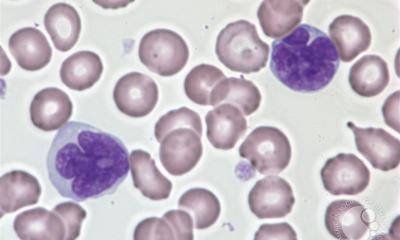Image source: Adobe Stock/SciePro
News • Cell production changes as an early warning
Blood test could predict future risk of leukaemia
A blood test could predict risk of developing leukaemia in the elderly population years in advance by identifying changes in blood cell production, according to new research.
The findings have been published in the journal Nature Medicine.
By identifying those most at risk it should be possible to provide preventive or early treatment in the future to improve patient outcomes, experts say. Leukaemia is often the result of the disruption to the fine balance in blood cell production where new cells are manufactured and old blood cells die. As we age, mutations in blood stem cells can mean that the altered cells can have a growth benefit over other blood cells and outnumber them in what is referred to as fitness advantage.
Researchers from the Universities of Edinburgh and Glasgow investigated how changes in fitness advantage that occur in blood production might provide clues to risk of developing leukemia depending on the type of mutation that occurs. "We measured changes in the blood samples of 83 older individuals of the Lothian Birth Cohorts, taken every three years over a 12-year period. Using the combined knowledge of mathematicians, biologists and genome scientists, we set out to understand what these changes mean for our risk of developing leukemia as we grow older," said Dr Tamir Chandra, Chancellor’s Fellow at University of Edinburgh's MRC Human Genetics Unit.
The Lothian Birth Cohorts 1921 and 1936 are longitudinal studies of brain, cognitive and general ageing which have followed up individuals every 3 years between the ages of 70 and 82 for the 1921 cohort and the ages of 79 to 92 for 1936.
By linking genomic data with machine learning we have been able to predict the future behaviour of blood cells based on the mutations they develop
Linus Schumacher
The team then combined these complex genomic data with a machine-learning algorithm to link different mutations with different growth speeds of blood stem cells carrying these mutations. It was found that specific mutations give distinct fitness advantages to stem cells measured in people without leukaemia - this can then be used to forecast how quickly the mutated cells will grow, which determines leukaemia risk.
The team say that further research is needed to validate these results in a larger population due to the limited sample size in the current study. "In knowing an individual patient’s risk of developing leukemia, clinicians can schedule shorter gaps between appointments in those most likely to develop the disease and provide early treatment, which is more likely to be successful," said Dr Kristina Kirschner, Co-lead author and Senior Lecturer at University of Glasgow’s Institute of Cancer Sciences. "To understand leukemia risk, we need to consider the balance between the different cells involved in blood cell production and how this balance changes as we grow older. By linking genomic data with machine learning we have been able to predict the future behaviour of blood cells based on the mutations they develop," added Dr Linus Schumacher, Co-lead author and Chancellor’s Fellow at the Centre for Regenerative Medicine of the University of Edinburgh.
This research was funded by the Medical Research Council, Leukemia UK and Cancer Research UK.
Source: University of Edinburgh
14.07.2022





